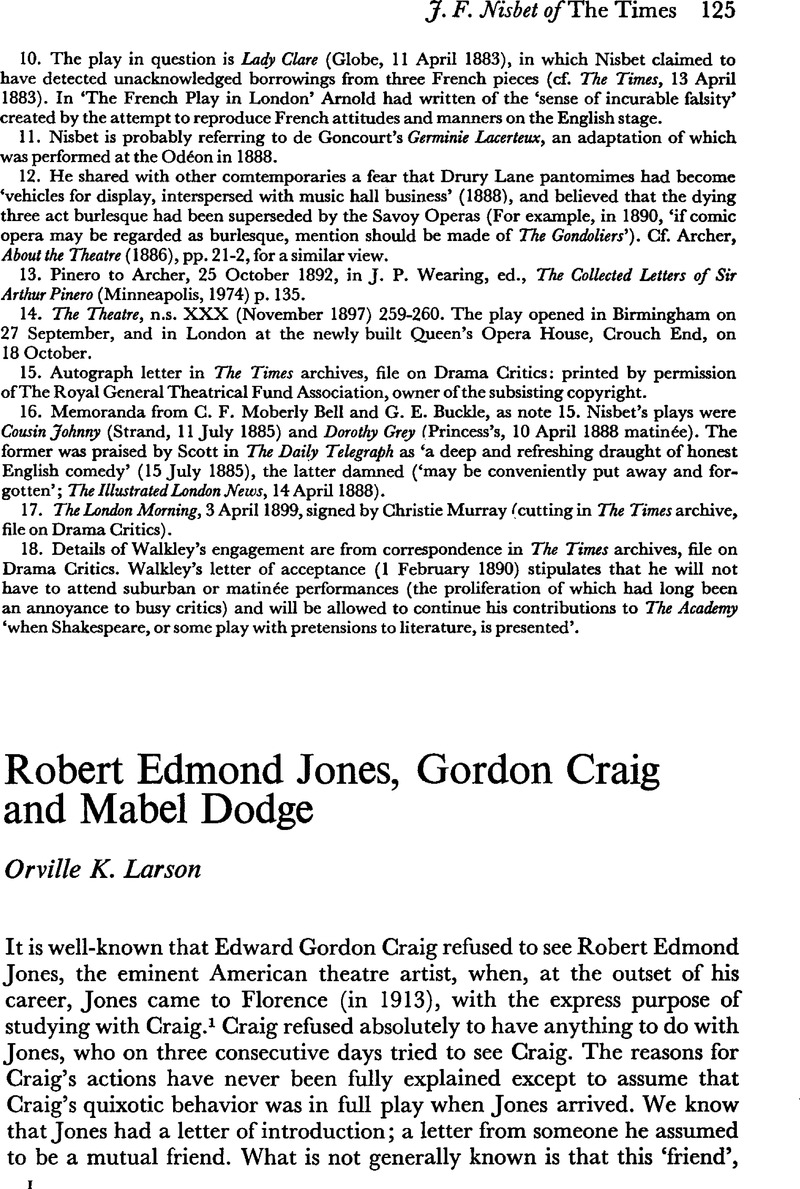Published online by Cambridge University Press: 23 January 2009

1. For an account of his early career see Moderwell, Hiram K., ‘The Art of Robert Edmond Jones’, Theatre Arts Magazine II (02, 1917), pp. 51–61.Google Scholar
2. Rubinstein, Arthur, My Young Years, New York, 1973, p. 414.Google Scholar
3. See Dodge, Mabel's three volume autobiography, Intimate Memories; Background Vol. One, New York, 1933Google Scholar; European Experiences Vol. Two, New York, 1935Google Scholar; and Movers and Shakers Vol. Three, New York, 1936Google Scholar. She recalls her association with Robert Edmond Jones in Vol. Three. See also Hapgood, Hutchins, A Victorian in the Modern World, New York, 1939Google Scholar. Hapgood was a very close friend and he gives detailed accounts of Mabel Dodge's activities in his autobiography.
4. For the best account of Reed's relationship with Jones, see Hicks, Granville, John Reed, The Making of a Revolutionary, New York, 1936Google Scholar. See especially p. 82 for details of their meeting in Greenwich Village.
5. See Movers and Shakers, pp. 186–264Google Scholar, for details and description of the pageant. Mabel Dodge includes a synopsis of the eight scenes in her account.
6. Author's note: my italics.
7. Movers and Shakers, p. 218Google Scholar. Draper, Muriel in Music at Midnight. New York, 1929, pp. 119–34Google Scholar also describes in detail the activities of the Villa Curonia during Jones' first days in Florence. Muriel Draper was a guest of the Dodge's at the time.
8. Mabel Dodge's descriptions of Gordon Craig and their meeting on the train is taken in its entirety from European Experiences, pp. 347–51.
9. Craig, Edward A., Gordon Craig: Story of his Life. New York, 1968, p. 233.Google Scholar
10. ibid., p. 254.
11. In all probability Craig was referring to his son Edward A. Craig in this instance, as Gordon Craig was in the habit of calling Elena, Edward A's mother, Nellie. Arnold Rood, the eminent Craig scholar has suggested another interpretation: knowing Craig's fondness for word games, especially with women he was interested in, Rood conjectures that Craig was actually offering himself to Mabel Dodge when he spoke of giving her ‘his little Dionysus’. Rood points out that when Craig spoke or thought about his mother, Ellen Terry, in the third person he quite often referred to her also as Nellie. If this is the case, Mabel Dodge certainly missed Craig's double entendre.
12. (Anonymous), ‘The Gentlemen of Decoration’, New York Times, 02 14 1915, VII, p. 4.Google Scholar
13. Hicks, , John Reed, p. 108.Google Scholar
14. I am indebted to Dr. Fredrick J. Hunter of the Department of Drama of the University of Texas in Austin, who most graciously checked through the Gordon Craig daybooks in the Hoblitzelle Theatre Arts Library of the University of Texas, for any references to Mabel Dodge or their meeting, or ‘the great idea’. He found none, but he did come across Craig's reply to Mabel Dodge in 1935 among the Craig letters in the collection. I am most grateful for Dr Hunter's assistance.
15. The Francis Steegmuller study of the Duncan–Craig romance: Your Isadora The Love Story of Isadora Duncan and Gordon Craig/Isadora Duncan, edited with connecting text by Francis Steegmuller, New York, 1974, certainly exposes the quiet and almost malevolent manner in which the young Craig regarded and treated women, so that it is not improbable to surmise that to be ‘pushed off’, as he was by Mabel Dodge (to use her own phrase), was not a thing Craig was to take lightly, regardless of what he was apt to say years later.